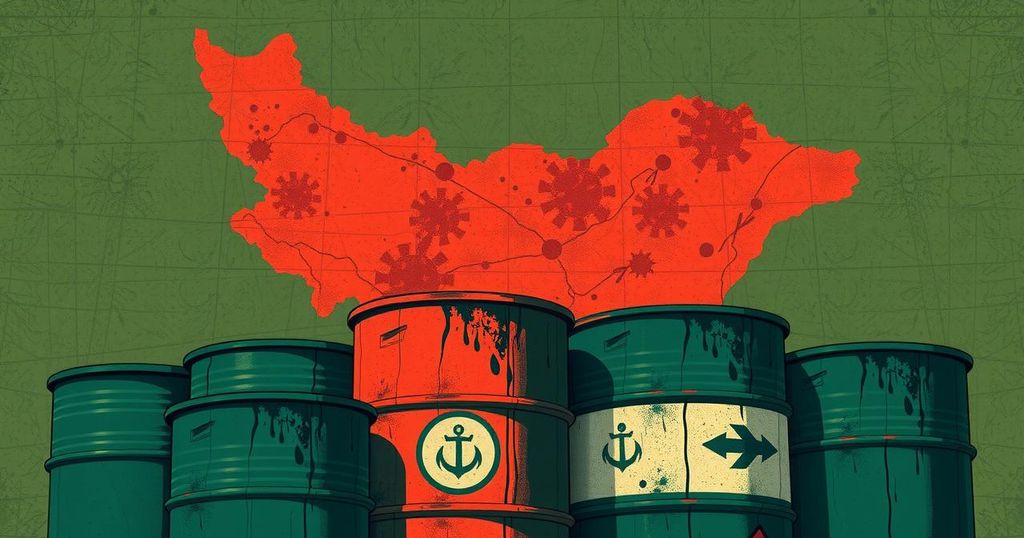The U.S. has imposed sanctions on Iranian Oil Minister Mohsen Paknejad and several vessels aiding Iranian oil exports. Amid economic pressures, Iran is considering talks with the U.S. regarding its nuclear program, yet firmly rejects any major concessions. Tensions remain high following Trump’s sanctions and Iran’s increased uranium stockpile, complicating potential negotiations.
On Thursday, the United States imposed sanctions on Iran’s Oil Minister Mohsen Paknejad, as well as several Hong Kong-flagged vessels involved in disguising Iranian oil shipments. According to the U.S. Treasury Department, Paknejad manages the export of Iranian oil, which reportedly amounts to tens of billions of dollars, and has allocated substantial oil supplies for export by Iran’s armed forces.
The sanctions also extend to the owners and operators of vessels that have facilitated the delivery of Iranian oil to China or extracted it from storage within the country. This includes vessels operating under various jurisdictions, such as India and China, indicating a broad network supporting Iran’s oil export activities. Notable designated vessels include the Hong Kong-flagged Peace Hill and the Iran-flagged Polaris 1, among others.
In light of economic pressures from these sanctions, Iran is contemplating the potential for negotiations with the United States, despite firmly resisting major concessions. President Donald Trump has advocated for a new nuclear agreement since his inauguration in January, while maintaining a strict sanctions policy. Iran, however, has officially dismissed direct engagement as long as sanctions remain in place, with President Masoud Pezeshkian affirming the nation would not yield to humiliation.
Following Trump’s assertion of sending a letter to Iran’s Supreme Leader Ayatollah Ali Khamenei for negotiations, Iranian leadership responded largely with skepticism. Khamenei characterized U.S. threats as unwise and insisted that negotiations would not relieve the sanctions, thus tightening the sanctions regimen further. Additionally, he emphasized that Iran is not pursuing nuclear weapons and regarded U.S. overtures as a form of public manipulation.
Trump’s proposed agreement appears to encompass Iran’s nuclear program and missile capabilities, as well as its connections to militant groups opposed to Israel. Iran has signaled a willingness to consider discussions solely concerning the militarization of its nuclear capabilities, outright rejecting talks aimed at dismantling its peaceful nuclear efforts.
Khamenei has condemned what he perceives as bullying tactics employed by other governments, asserting that negotiations merely serve their objectives of asserting dominance over Iran. He stated that ongoing negotiations are accompanied by new demands that Iran will not acquiesce to, reflecting on the country’s unfavorable past dealings with the United States.
Following Trump’s renewed sanctions after withdrawing from the 2015 nuclear deal, Iran has gradually scaled back its commitments under the agreement. As economic conditions worsen, with the Iranian rial plummeting and inflation soaring, the difficulties faced by millions of Iranians have intensified due to these sanctions. Meanwhile, Iran continues to engage in separate nuclear discussions with Britain, France, and Germany, alongside upcoming talks involving China and Russia.
The International Atomic Energy Agency has reported a significant increase in Iran’s stockpile of highly enriched uranium to 60 percent purity, nearing the threshold required for nuclear weapons. Iran has consistently maintained that its nuclear ambitions are exclusively for peaceful purposes, adding another layer of complexity to the ongoing geopolitical strife.
In conclusion, the recent U.S. sanctions against Iran’s Oil Minister and associated vessels emphasize ongoing tensions related to Iranian oil exports and the nation’s nuclear ambitions. While Iran contemplates negotiations under pressure from sanctions, the leadership remains steadfast against perceived U.S. dominance and manipulation. As the situation develops, the potential for conflict remains heightened, particularly in light of Iran’s nuclear stockpile increases and the historical context of U.S.-Iran relations.
Original Source: www.newarab.com






